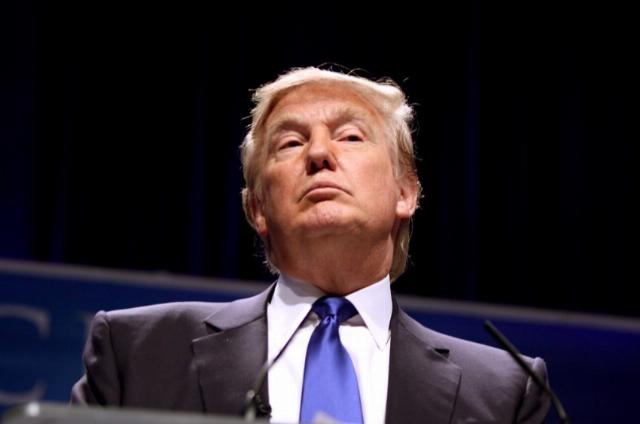Trump’s VP and the Twelfth Amendment
There’s a fair amount of speculation these days about whom Trump will choose as a running mate. Guessing games can often attract a crowd. The names of Ron DeSantis and Marco Rubio, along with even Donald Trump, Jr., are being bandied about.
There is a catch. It’s called the Twelfth Amendment: “The Electors shall meet in their respective states, and vote by ballot for President and Vice President, one of whom, at least, shall not be an inhabitant of the same state with themselves.”
This particular clause did not change the Constitution. It was carried forward from Article II, Section 1 so as to maintain the same rule, in spite of the amendment, which changed the way in which the vice president was chosen. Originally, the veep was the second-place finisher in the Electoral College. In the election of 1800, there was an electoral tie between Thomas Jefferson and Aaron Burr, so the House of Representatives chose Jefferson to be president and Burr to be vice president. Needless to say, they didn’t get along very well, so the Twelfth Amendment was ratified and took effect for the next election in 1804. On July 11 of that same year, Burr killed Alexander Hamilton in a duel.
Just to be clear, it is still possible for both the president and vice president to live in the same state, but the electors of that state cannot vote for both of them. For states such as Wyoming and Alaska, this doesn’t matter all that much. Florida, however, has thirty electoral votes, and that ain’t chopped liver. Texas has thirty-eight electoral votes. When Texas governor George W. Bush chose him to be his running-mate, Dick Cheney promptly quit his job at Haliburton in Houston and scooted back up to Wyoming to register to vote.
This is certainly not to disparage DeSantis and Rubio, who are both excellent public servants. The only thing wrong with them and Trump Jr. is that they live in Florida. Should DeSantis or Rubio move to another state to establish eligibility, he would have to resign his office. Otherwise, would Trump Senior move back to New York? I can’t say, but it would solve the problem being here discussed.
There are other rather attractive vice presidential choices. Townhall’s Kevin McCullough conjured up New York’s Lee Zeldin. It’s easy to be OK with him and several others. And keeping everybody guessing helps focus attention on Trump’s candidacy, which is good. Biden is stuck with Harris. Oh, dear! But it is also useful to consider the electoral and subsequent administrative relevance of the vice president.
There is more than one reason for a presidential candidate to choose a particular person as his running mate. Our current veep, Kamala Harris, was chosen because she is a “black” woman. In modern jargon, this is known as intersectionality: checking multiple boxes in a contest where it matters more what you are than who you are. In retrospect, Harris may also be 25th Amendment insurance, meaning that a committee empowered to decide if Biden should continue to serve would choose him over her, for obvious reasons.
The negative consequences of that choice have always been obvious. When Nixon chose Spiro Agnew, it was for the veep to serve as a lightning rod — to divert away from the top of the ticket the inevitable incoming media and political attacks. Gravitas was the knee-jerk explanation for George W. Bush’s choice of Dick Cheney. I call it “ticket balancing”: drawing in the other voters who may not have been all there for Bush Junior.
Ultimately, it’s just disappointing to see major-league commentators ignore this important legal issue. Forfeiting Florida’s thirty electoral votes in a seriously contested election fails the smell test. Rubio, DeSantis and Trump Jr. are valuable assets. But that is for the future. Let’s focus on today.

Image: Gage Skidmore via Flickr, CC BY-SA 2.0.
Ad Free / Commenting Login
FOLLOW US ON
Recent Articles
- The Danes and the Greenlanders: How They See Trump's America
- The USAID Case: Judge Amir Ali’s $2 Billion Defiance Escalates
- Terrifying Tariffs: Tax Policy as Back-Door Foreign Aid
- Dr. Marty Makary’s ‘Blind Spots’ Book Is At Odds With Established Findings
- Reforming the Kennedy Center
- Is ActBlue a Criminal Enterprise?
- America’s New Tough Love Foreign Policy
- Democrats Stand for Ukraine but Sit for America
- A Friend for Trump in Italy
- Trump’s Digital Fort Knox: Bitcoin, the Dollar, and America’s Financial Future
Blog Posts
- After blowing $9 billion on 'free' health care for illegals, California's Gov. Gavin Newsom asks for a bailout
- Trump throws down the gauntlet to the out-of-control federal district court judges *UPDATED*
- Ronald Reagan also had a slow economic start
- Getting the left out of the political wilderness
- Oregon selects a trans-turtle and a trans-meteor to sit on a ‘mental health advisory board’
- Fly the DEI skies...and hope that you land safely
- This 70-year-old woman is serving 9 years in prison
- Stacey Abrams really, really, wants 'her' $2 billion from Biden's EPA slush fund
- The (un)masked magician’s apprentice
- Schumer’s attempted shutdown will backfire bigly
- The Democrats are so passionate ...
- Biden and the U.S. Steel case
- Jay Bhattacharya's promise on vaccine safety
- MAGA moon over Greenland?
- Trump must designate the Muslim Brotherhood a terrorist organization






